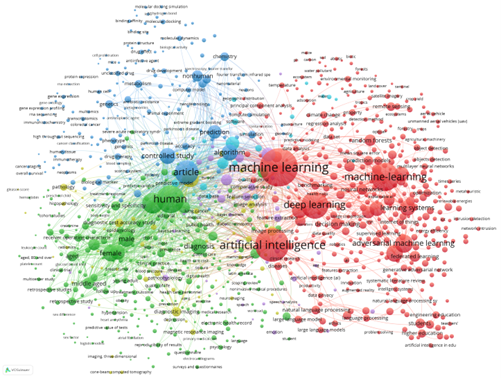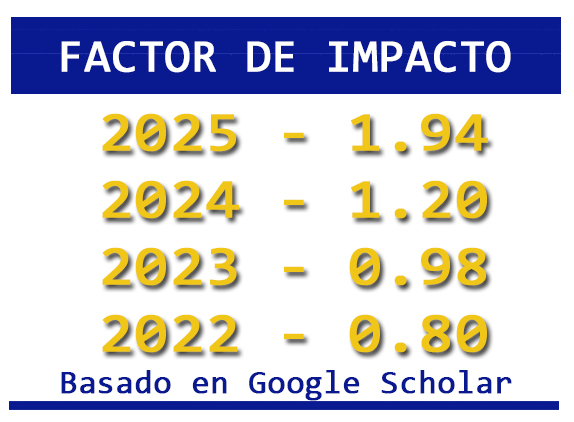Scientific Production on Artificial Intelligence in Latin America: A Bibliometric Analysis
DOI:
https://doi.org/10.36790/epistemus.v19i38.457Keywords:
Latin America, artificial intelligence, scientific production, bibliometeic analysisAbstract
This study analyzes the scientific production on artificial intelligence (AI) in Latin America between January 2020 and July 2025. A bibliometric methodology was applied based on publications indexed in Scopus and extracted through the OECD Policy Observatory panel on AI. Publications were classified by country, document type, and impact level according to the FWCI: high (>1.5), medium (0.5–1.5), and low (<0.5). The results show a strong concentration in Brazil (45.87%), followed by Mexico (18.46%), Colombia (9.41%) and Chile (8.93%). Ecuador (5.09%), Peru (4.12%) and Argentina (3.12%) have a growing participation, although with less international visibility. It concludes that, despite regional progress, structural asymmetries persist in scientific capacity. This article provides empirical evidence to support the design of public policies in science and technology, contributing to the achievement of SDG 9 and SDG 17.
Downloads
References
C. Delcea, I. Nica, Ș. Ionescu, B. Cibu, and H. Țibrea, “Mapping the Frontier: A Bibliometric Analysis of Artificial Intelligence Applications in Local and Regional Studies,” Algorithms, vol. 17, no. 9, p. 418, Sep. 2024, DOI: https://doi.org/10.3390/a17090418
T. Farrelly and N. Baker, “Generative Artificial Intelligence: Implications and Considerations for Higher Education Practice,” Educ Sci (Basel), vol. 13, no. 11, p. 1109, Nov. 2023, DOI: https://doi.org/10.3390/educsci13111109
W. Xie, A. Hu, Q. Xie, J. Chen, R. Wan, and Y. Liu, “Bibliometric analysis and review of AI-based video generation: research dynamics and application trends (2020–2025),” Discover Computing, vol. 28, no. 1, p. 130, Jun. 2025, DOI: https://doi.org/10.1007/s10791-025-09628-9
Y. K. Dwivedi et al., “Opinion Paper: ‘So what if ChatGPT wrote it?’ Multidisciplinary perspectives on opportunities, challenges and implications of generative conversational AI for research, practice and policy,” Int J Inf Manage, vol. 71, p. 102642, Aug. 2023, DOI: https://doi.org/10.1016/j.ijinfomgt.2023.102642
United Nations Educational, Scientific and Cultural Organization (UNESCO), Guidance for generative AI in education and research. Francia, F. Miao and W. Holmes (Eds.), p. 44, Aug. 2023. DOI: https://doi.org/10.54675/EWZM9535
S. Singh, S. Singh, S. Kraus, A. Sharma, and S. Dhir, “Characterizing generative artificial intelligence applications: Text-mining-enabled technology roadmapping,” Journal of Innovation & Knowledge, vol. 9, no. 3, p. 100531, Jul. 2024, DOI: https://doi.org/10.1016/j.jik.2024.100531
M. Mariani and Y. K. Dwivedi, “Generative artificial intelligence in innovation management: A preview of future research developments,” J Bus Res, vol. 175, p. 114542, Mar. 2024, DOI: https://doi.org/10.1016/j.jbusres.2024.114542
M. Pimentel, J. Veliz, and L. Lazo, “Analysis of Intelligence and National Security in Latin America: Bibliometric Analysis,” Compendium: Cuadernos de Economía y Administración, vol. 11, no. 1, pp. 1-27, Apr. 2024, DOI: https://doi.org/10.46677/compendium.v11i1.1245
J. Corzo-Zavaleta, Y. Navarro-Castillo, and M. Ugaz-Rivero, “Uso de la inteligencia artificial en la educación universitaria,” Desde el Sur, vol. 17, no. 1, p. e0010, Jan. 2025, DOI: http://dx.doi.org/10.21142/des-1701-2025-0010
D. M. Obreja, R. Rughiniș, and D. Rosner, “Mapping the conceptual structure of innovation in artificial intelligence research: A bibliometric analysis and systematic literature review,” Journal of Innovation & Knowledge, vol. 9, no. 1, p. 100465, Jan. 2024, DOI: https://doi.org/10.1016/j.jik.2024.100465
A. de la Torre and M. Baldeon-Calisto, “Generative Artificial Intelligence in Latin American Higher Education: A Systematic Literature Review,” in 2024 12th International Symposium on Digital Forensics and Security (ISDFS), IEEE, Apr. 2024, p. 7. DOI: https://doi.org/10.1109/ISDFS60797.2024.10527283
T. Salahuddin and H. Vergil, “Hedonistic Pursuits and Well-Being: A Retrospective Analysis of Expectations and Reality,” Pakistan Journal of Life and Social Sciences (PJLSS), vol. 22, no. 2, 2024, DOI: https://doi.org/10.57239/PJLSS-2024-22.2.00865
F. Wu, Y. Dang, and M. Li, “A Systematic Review of Responses, Attitudes, and Utilization Behaviors on Generative AI for Teaching and Learning in Higher Education,” Behavioral Sciences, vol. 15, no. 4, p. 467, Apr. 2025, DOI: https://doi.org/10.3390/bs15040467
P. Gupta, B. Ding, C. Guan, and D. Ding, “Generative AI: A systematic review using topic modelling techniques,” Data Inf Manag, vol. 8, no. 2, p. 100066, Jun. 2024, DOI: https://doi.org/10.1016/j.dim.2024.100066
M. I. Denegri-Velarde, B. P. Solis-Trujillo, M. D. C. E. Ancaya-Martínez, C. A. Zerga-Morante, A. P. Espiritu-Martinez, and R. Romero-Carazas, “ChatGPT and Artificial Intelligence a Bibliometric Analysis in Latin America,” International Journal of Religion, vol. 5, no. 5, pp. 931–939, Apr. 2024, DOI: https://doi.org/10.61707/amhw4161
OECD.AI, “data from Elsevier,” OECD Better Policies For Better Lives. Accessed: Aug. 4, 2025. [Online]. Available: https://oecd.ai/
J. Gonzalez-Argote et al., “Trends in scientific output on artificial intelligence and health in Latin America in Scopus,” ICST Transactions on Scalable Information Systems, Apr. 2023, DOI: https://doi.org/10.4108/eetsis.vi.3231
F. Del Carpio-Delgado et al., “Telemedicine in Latin America: a bibliometric analysis,” EAI Endorsed Trans Pervasive Health Technol, vol. 9, Oct. 2023, DOI: https://doi.org/10.4108/eetpht.9.4273
M. Flórez, “The Shaping of AI Policies in Latin America: A Study of International Influence and Local Realities,” in Public Governance and Emerging Technologies, Cham: In: Goossens, J., Keymolen, E., Stanojević, A. (eds) Public Governance and Emerging Technologies. Springer, Cham, 2025, pp. 263–287. DOI: https://doi.org/10.1007/978-3-031-84748-6_12
M. Humeres, D. Cotoras, R. Moretti, I. Oyarzún-Merino, T. Correa, and C. López, “Cooling down AI regulation controversies: Three closure processes in the Chilean legislative arena,” Big Data Soc, vol. 12, no. 1, Mar. 2025, DOI: https://doi.org/10.1177/20539517241311067
F. Filgueiras, “Designing artificial intelligence policy: Comparing design spaces in Latin America,” Lat Am Policy, vol. 14, no. 1, pp. 5–21, Mar. 2023, DOI: https://doi.org/10.1111/lamp.12282
G. Herrera-Franco, N. Montalván-Burbano, C. Mora-Frank, and Lady Bravo-Montero, “Scientific Research in Ecuador: A Bibliometric Analysis,” Publications, vol. 9, no. 4, p. 55, Dec. 2021, DOI: https://doi.org/10.3390/publications9040055
A. Veronese and A. Nunes L.E.L., “Regulatory paths for artificial intelligence in Latin American countries with data protection law frameworks: limits and possibilities of integrating policies,” Revista Latinoamericana de Economía y Sociedad Digital, no. 2, Aug. 2021, DOI: https://doi.org/10.53857/CJFB4918
R. Zambrano and J. M. Sanchez-Torres, “AI Public Policies in Latin America: Disruption or more of the same?,” in 14th International Conference on Theory and Practice of Electronic Governance, New York, NY, USA: ACM, Oct. 2021, pp. 25–33. DOI: https://doi.org/10.1145/3494193.3494294
P. Lara-Navarra, A. Ferrer-Sapena, E. Ismodes-Cascón, C. Fosca-Pastor, and E. A. Sánchez-Pérez, “The Future of Higher Education: Trends, Challenges and Opportunities in AI-Driven Lifelong Learning in Peru,” Information, vol. 16, no. 3, p. 224, Mar. 2025, DOI: https://doi.org/10.3390/info16030224
A. Deroncele-Acosta, R. M. E. Sayán-Rivera, A. D. Mendoza-López, and E. D. Norabuena-Figueroa, “Generative Artificial Intelligence and Transversal Competencies in Higher Education: A Systematic Review,” Applied System Innovation, vol. 8, no. 3, p. 83, Jun. 2025, DOI: https://doi.org/10.3390/asi8030083

Additional Files
Published
How to Cite
Issue
Section
License
Copyright (c) 2025 EPISTEMUS

This work is licensed under a Creative Commons Attribution-NonCommercial-ShareAlike 4.0 International License.
The magazine acquires the patrimonial rights of the articles only for diffusion without any purpose of profit, without diminishing the own rights of authorship.
The authors are the legitimate owners of the intellectual property rights of their respective articles, and in such quality, by sending their texts they express their desire to collaborate with the Epistemus Magazine, published biannually by the University of Sonora.
Therefore, freely, voluntarily and free of charge, once accepted the article for publication, they give their rights to the University of Sonora for the University of Sonora to edit, publish, distribute and make available through intranets, Internet or CD said work, without any limitation of form or time, as long as it is non-profit and with the express obligation to respect and mention the credit that corresponds to the authors in any use that is made of it.
It is understood that this authorization is not an assignment or transmission of any of your economic rights in favor of the said institution. The University of Sonora guarantees the right to reproduce the contribution by any means in which you are the author, subject to the credit being granted corresponding to the original publication of the contribution in Epistemus.
Unless otherwise indicated, all the contents of the electronic edition are distributed under a license for use and Creative Commons — Attribution-NonCommercial-ShareAlike 4.0 International — (CC BY-NC-SA 4.0) You can consult here the informative version and the legal text of the license. This circumstance must be expressly stated in this way when necessary.
The names and email addresses entered in this journal will be used exclusively for the purposes established in it and will not be provided to third parties or for their use for other purposes.














